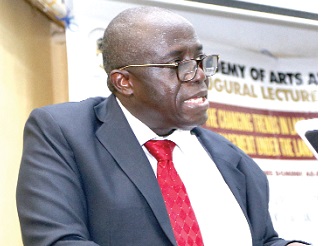
Don’t allow clerks to extend remand periods
A Justice of the Court of Appeal, Justice Dennis Dominic Adjei, has advised magistrates and judges not to allow their clerks to extend the remand period for accused persons.
He said in recent times, persons standing trial have been remanded beyond the 14 maximum days prescribed by the Constitution in violation of their fundamental human rights.
“It is only judges and magistrates who have the power to remand, but if we allow our court clerks to extend dates, it means that we are giving judicial power to them, and that is why accused persons are kept in jail for over three years on remand.
“When the 14 days mature, those accused persons are not brought, and sometimes when they come and the court is not sitting, the clerks give dates, which is unlawful,” he said in Accra at a day’s workshop on the Narcotics Control Commission Act 2020 [Act 1019] for magistrates and judges.
Justice Adjei, therefore, urged the magistrates and judges to ensure that they kept track of the accused persons to ensure that their rights were not unduly violated, stressing that: “we should ensure that when we remand, we keep an eye on the remandees and record them in our diary. When we are sitting as judges and magistrates, we must bear in mind that we have so many people on remand who are to be brought for bail consideration or hearing”.
He further explained that the move would also help to decongest the county’s prisons.
Workshop
Jointly organised by the POS Foundation and the Judicial Training Institute, the workshop was dubbed: “Understanding the Narcotics Control Commission Act 2020 (Act 1019); The Role of Judges in health and rights-based best practices to handling people who use drugs in the implementation of the Act”.
It was in partnership with International Drug Policy Consortium (IDPC) and the Ghana chapter of the West Africa Drug Policy Network (WADPN).
It was the latest in a series of engagements for stakeholders on the implementation of the new law passed on March 20, 2020.
The workshop — attended by magistrates and judges from Greater Accra, Volta, Eastern, Central and Western regions — was also to sensitise them to know their role in the delivery of the law while consulting them on the best practice in the implementation process.
The Executive Director of POS Foundation, Jonathan Osei Owusu, explained that with the intervention of the Justice For All programme spearheaded by his outfit, an accused person who had spent over 20 years on remand was released.
He said there were loopholes in the Criminal and Other Offences (Procedure) Act, 1960 Act 30, which needed to be reviewed.
He said, for instance, judges may be willing to commit convicts for a non-custodial sentence, but the law limited them.
Prisons
The Director-General of the Ghana Prison Service, Isaac Kofi Egyir, said convicts in prison custody for the offence of “use of narcotic drugs” were not many though, compared to other drug-related offenders.
He, however, noted that majority of them were in their youthful age between 18 and 35 years.
The Ghana Prisons Service, he said, supports appropriate alternatives to imprisonment for such young people.
“The service further advocates that this group of users should be referred to the appropriate rehabilitation centres for treatment instead of being incarcerated considering the risk of contamination and other related challenges for such persons in congested prison environments,” he added.
